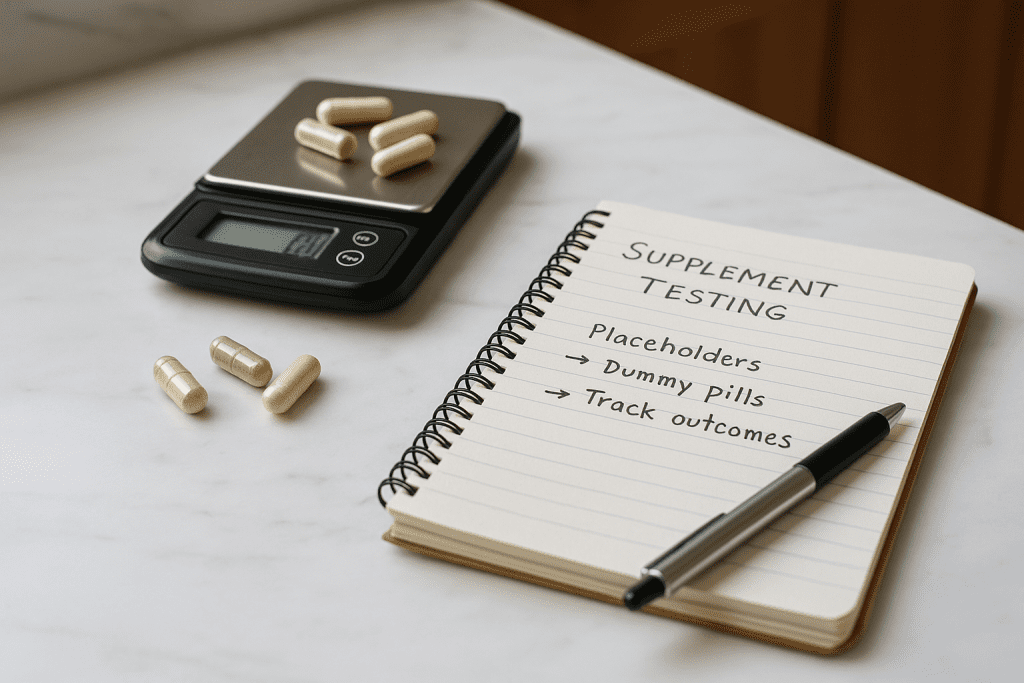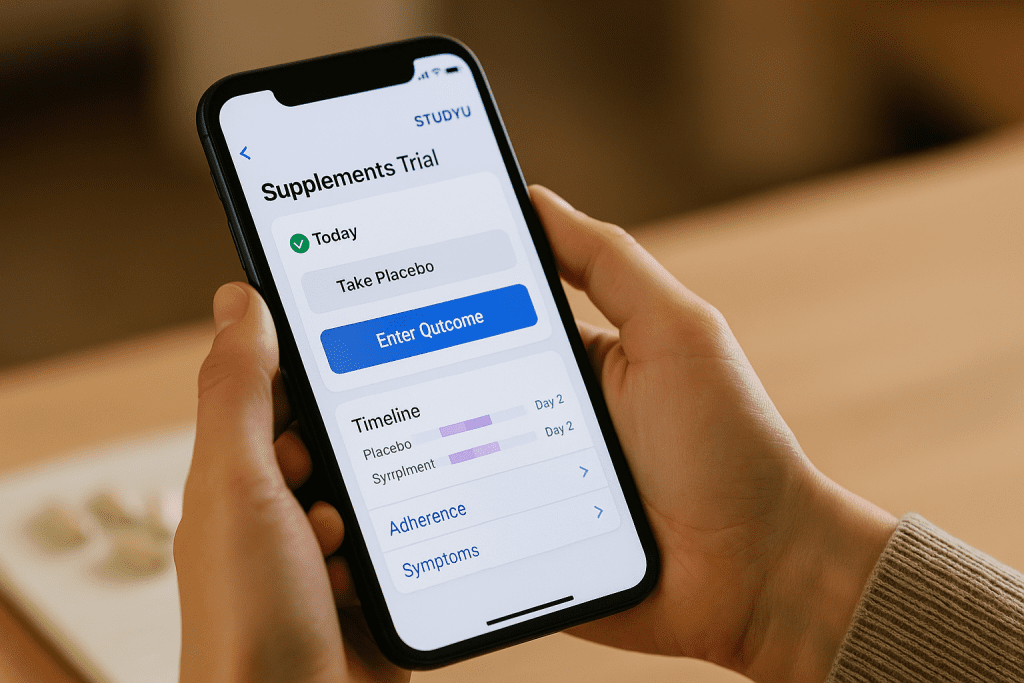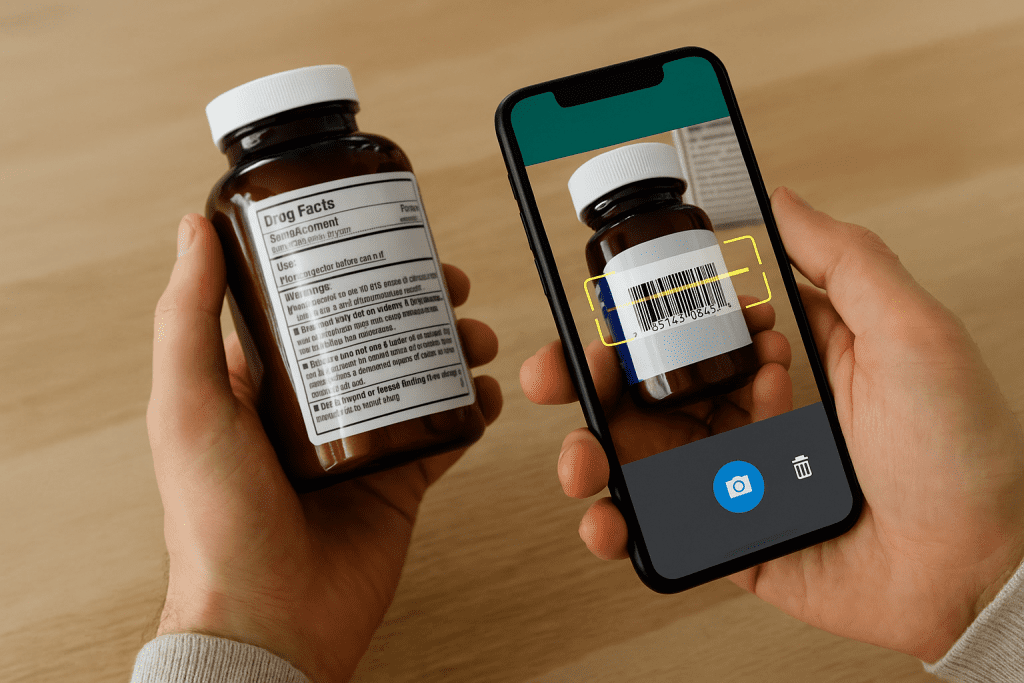Can you really tell if your supplement is working, or is it just a placebo? As interest grows in blinded supplement trials and apps that track supplement effectiveness without bias, more users are asking this question.
This article explains how digital tools make double-blind personal testing accessible and reliable, helping you get real, data-backed answers.
We’ll break down the science behind self-blinded trials, explore the best platforms for personal use, and examine the limitations you should know before trusting the results.
Summary / Quick Answer
Yes, you can track supplement effectiveness using blinded trials and apps. Here’s how:
- Use self-blinding methods with identical placebo and active pills
- Choose apps like StudyU or StudyMe for structured N-of-1 trials
- Set measurable outcomes and track them over randomized periods
- Analyze results with built-in tools that reduce bias
- Scan supplements for third-party verification (e.g., NSF, BSCG)
Blinded supplement trial methods, supported by double-blind personal testing apps, offer data-driven ways to measure what really works for you.
Why Blinding Matters in Personal Supplement Testing

Most people rely on how they feel when evaluating a supplement, but feelings can be deceiving. The placebo effect—where you experience benefits simply because you expect them—is strong. That’s why professional clinical trials rely on blinding.
In a blinded supplement trial, users don’t know whether they’re taking the actual supplement or a placebo. This helps isolate the true effects of the product. With tools like over-encapsulation (putting supplements into identical capsules) and randomized schedules, even individuals can now apply these gold-standard research practices.
Here’s what makes personal blinding valuable:
| Benefit | Why It Matters |
|---|---|
| Removes expectation bias | Separates real effects from placebo |
| Uses you as your own control | Improves accuracy of small sample studies |
| Tracks over time | Captures subtle, delayed effects |
| Can reveal no-effect products | Avoids wasting money on ineffective pills |
Some apps and guides suggest creating dummy capsules using empty gel caps and an inert substance (like rice flour) to mirror your active supplement. It’s not perfect, but it helps maintain blindness.
The Best Apps for Double-Blind Personal Testing
Digital tools now allow anyone to run scientifically sound supplement trials—without needing a lab. Two of the most well-regarded platforms are StudyU and StudyMe, both designed for user-led N-of-1 trials.
StudyU: Advanced Blinding with Open-Source Support
The StudyU platform combines trial design with participation. Users create randomized testing periods, set custom outcomes, and record symptoms over time. The system uses machine learning to help detect patterns and personalize insights. Because it’s open-source, users can inspect how data is handled or self-host the tool for added privacy.
Features include:
- Randomized crossover trial design
- Transparent protocol customization
- Scientific structure with minimal setup
- Placebo periods built into the app’s logic
StudyU is especially valuable for people conducting serious self-research with supplements that affect mood, energy, or cognition.
StudyMe: User-Friendly Testing for Everyday Health Goals

StudyMe is built for accessibility. Even without technical training, users can set up structured supplement trials with randomized dosing, washout periods, and outcome tracking.
According to user studies, it scored 82/100 on the System Usability Scale. With guided steps, it’s ideal for evaluating daily-use supplements like magnesium, probiotics, or adaptogens.
Are you curious how this compares to basic logging tools? See our MyNetDiary vs. manual interaction tracking comparison for insight into passive vs. active data collection.
Self-Blinding in the Real World: How It Works
Think blinding only happens in labs? A series of real-world experiments using psychedelic microdosing proves otherwise. Researchers showed that self-blinding is feasible at home, with a bit of planning.
Participants randomized capsule order with QR codes and created placebo duplicates of psilocybin doses using inert fillers. This approach kept them unaware of whether they took the active dose or placebo on a given day. Results? In many cases, perceived benefits aligned more with expectation than with actual substance intake.
Even in supplement testing, sensory cues like taste or after-effects can unblind users. That’s why success depends on closely matching appearance, weight, and flavor between active and placebo capsules.
Tips for DIY Blinding:
- Use empty capsules with matching size and color
- Weigh each pill for consistency
- Randomize intake using an app or calendar
- Record symptoms daily without knowing what you took
Some platforms like Trustified offer blind testing kits, though these aren’t yet mainstream.
How to Track Supplement Effectiveness Like a Scientist
Running a blinded test is only half the equation—you also need to track supplement effectiveness with measurable outcomes. Apps can help, but your input matters too.

Here’s what to do:
- Define a clear goal (e.g., “improve sleep quality” or “reduce daily bloating”)
- Choose consistent metrics, like mood logs, wearable sleep scores, or stool quality ratings.
- Set trial length with active and placebo weeks (e.g., A-B-A-B format)
- Avoid adding new variables during your testing window
Supplement scanners like Prove It and Supplement Snoop can also help by offering unbiased, third-party reviews of product content.
| App/Tool | Key Use |
| StudyU | Full N-of-1 trial builder |
| StudyMe | Guided personal experimentation app |
| Supplement Snoop | Ingredient transparency + independent ratings |
| Prove It | Barcode scanner with scientific review access |
| NSF Certified for Sport | Official testing data on banned substances |
Limitations and What to Watch Out For
While blinded personal testing is promising, it’s not perfect. Here are a few barriers:
- Sensory clues can unblind users (strong taste, smell, or visible differences)
- A complex setup can deter casual users
- Cost of creating matching placebo capsules or over-encapsulation
- Expectation bias may still influence perceived outcomes
That said, even unblinded trials (where you know what you’re taking) offer insight if you track outcomes systematically. A study on statin tolerance found that both blinded and unblinded approaches helped patients resume medication more confidently.
Conclusion
Blinded supplement trial tools are reshaping how we approach wellness, bringing the rigor of clinical research into the hands of everyday users. With structured double-blind personal testing apps like StudyU and StudyMe and simple techniques like self-blinding capsules, it’s now possible to track supplement effectiveness with less bias.
But remember: even the best tools aren’t foolproof. Combine them with clear outcome goals and medical guidance when needed. For more ways to track your supplement interactions, see our MyNetDiary vs. manual interaction tracking article

